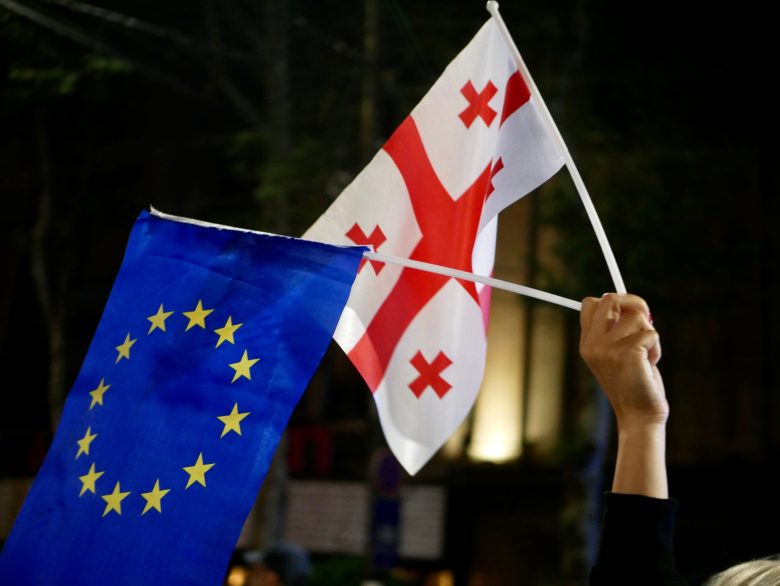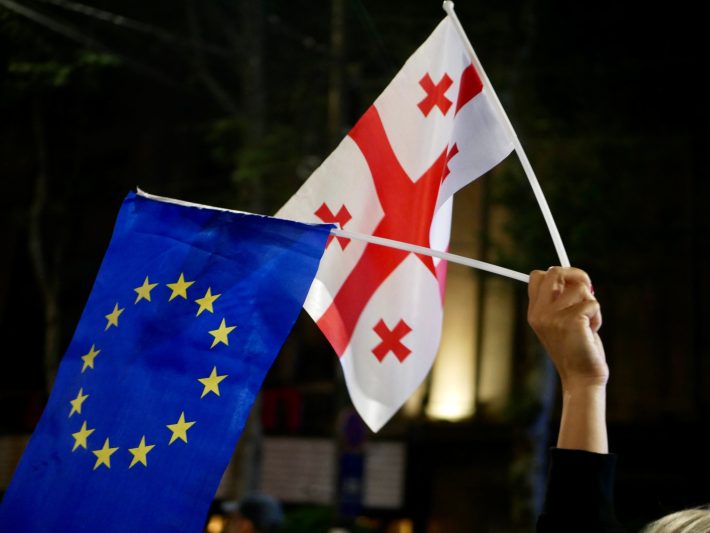By Santiago Bracho, Queen Mary University Graduate.
On the 18th of April 2024, the Georgian government led by the Georgian Dream Party’s Prime Minister Irakli Kobakhidze passed the highly controversial ‘Foreign Agent’s Bill’ through the first round of parliamentary proceedings. This decision was met with continuing mass protests across the streets of Georgia, concentrated in its capital Tbilisi. Despite those protests, the law was adopted during its third and final reading on the 14th of May.
The law makes NGOs, campaign groups, media outlets and non-commercial organisations, register themselves within Georgia as “foreign agents” if they receive over 20% of their funding from foreign sources. Within this status, organisations would have to register under a “foreign agents registry” or be subject to hefty fines. Opponents of the legislation claim that this is an attempt to stigmatise these organisations as ‘non-Georgian’ and silence government criticism. Also, in current Georgian law, NGOs are already required to have their funding sources publicly available, making the proposed law a bureaucratic restriction to hinder these organisations’ work.

Overall, Western media reporting on this issue has been very critical of the passing of the ‘Foreign Agents’ Bill’. The common narrative used is one of Georgia returning to the yolk of Russian oppression. The Times editorial referred to Russian influence within the law, as a “Bear Hug” around the Caucasus nation. Reputable publications such as The Guardian, claimed the law brings Georgia “towards closer ties to Russia”. Euronews also focused on how Georgia is being pulled into a Russian sphere of influence, as the European Commission claimed this law would put a halt to Georgia’s EU candidacy. CNN described it as a “Putin-style law”, as Russia passed an similar law in 2012, used to crush Russian organisations which do not adhere to their government’s line.
The comparison to Russia’s media laws, and the clear influence Putin is exercising over the Georgian government seems to be the most prescient focus on Western media coverage. However, this coverage fails to explain howa government could pass a bill that is so unpopular? Most polls show almost 80% of Georgians seek closer ties to the European single market, a prospect hindered once the ‘Foreign Agents’ Bill’ becomes law. Therefore, how could the Georgian government gather the support to enact such a law?
The rising homophobia of the Georgian government
Georgian Dream has been the ruling party in Georgia since 2011. The party is bankrolled and allegedly still controlled by oligarch millionaire Bidzina Ivanishvili. Following several corruption and electoral tampering scandals in 2021, Georgian Dream has increasingly sought to gather popular support with a strong nationalistic rhetoric. This includes (as they claim) protecting Georgia from foreign ideologies. This rhetoric helps us understand how the ‘Foreign Agents’ Bill’ fits into the Georgian Dream’s national plan.
In March 2024 the Kobakhidze government proposed a constitutional amendment which would make marriage only legal between a “biological male and a biological female”, prohibit gender transition, and same-sex couples adopting children. These proposed amendments occurred just one month before the passing of the ‘Foreign Agents’ Bill’, showcasing Georgian Dream’s political narrative. There is a concerted effort by the Georgian government to claim that LGBT Georgians, or the growing support for same-sex marriage amongst the Georgian youth are a result of Western influence, spread through funding of various Georgian NGOs. Under this context the ‘Foreign Agents’ Bill’ is not only an attempt to silence criticism of their government, but also as a deterrent to what they see as the corrupting, foreign influence of LGBT rights in Georgian society.
The ‘Foreign Agents’ Bill’ and its effect on LGBT people in Georgia has seldom been mentioned by Western media. It ’s ironic since Georgian Dream and its supporters claim these groups are the result of foreign influence of Western Europe and the USA. Yet these nations’ major media outlets do not mention the rising homophobia of the Georgian government, and its connection to the ‘Foreign Agents’ Bill’. Unfortunately, this is a common prejudice in the region, which the government exploits to boost their support. Through this narrative, LGBT Georgians are being deprived of their national character, treated as deviants, presenting ‘anti-Georgian’ behaviour. A bigoted idea, immediately countered by the fact that a vast majority of LGBT rights advocates in Georgia are grassroot local organisations.
Organisations such as Tblisi Pride – which has been one of the most outspoken LGBT advocacy groups in Georgia. They have organised mass Pride events which were attacked in 2021 and 2023. Another example, the Shame Movement, has mobilised tens of thousands of Georgians since 2019, and currently have made several attacks on Georgian Dream’s homophobic rhetoric. Furthermore, local organisations such as the women and LGBT rights’ group WISG, have conducted mass research on public opinion surveys regarding homophobia, which would not have been carried out without the foreign funding the government is targetting.
However, it appears Georgian Dream’s attempt to use nationalist rhetoric and homophobia, to push this censorial law has backfired. The moderate Georgian public opposes the ’Foreign Agents’ Bill’ as it seeks to bring Georgia closer to the Kremlin and further from European integration, a goal the overwhelming mass of the nation wishes to achieve.
Therefore, as Tblisi Pride organiser Tamar Jakeli states, the majority opposition towards the ‘Foreign Agents’ Bill’ is an opportunity around mass mobilisation for LGBT rights in Georgia. Georgia’s constitutional amendments repressing LGBT and gender recognition rights, have not had the same type of media attention in Western coverage as this current law has. Therefore, human rights and LGBT advocacy groups around the world have a moral duty to highlight this aspect of the conflict most media channels have ignored.
It is key for Western Media to take this opportunity to report on the struggles of Georgia’s LGBT community in this current national crisis. This a chance to demonstrate how LGBT rights are not special minority privileges or “luxury beliefs”, but a key and integral part of civic private rights, innately connected to our democratic integrity.
================
Find out more:
Listen to the News Agents report about the mass protests in Tbilisi over Georgia’s “Russian” foreign agent law.
The News Agents is an award-winning daily news podcast with Emily Maitlis, Jon Sopel and Lewis Goodall, three of the UK’s top journalists.
===============
Pictures from shutterstock.com
Disclaimer:
The views and opinions expressed in this article are solely those of the author and do not reflect the official policy or position of the Media Diversity Institute. Any question or comment should be addressed to [email protected]

